Introduction
Can rabbits eat raisins? Let’s find out.
Are raisins a hidden danger or a delectable treat for rabbits? Let’s separate fact from fiction and explore the pros and cons of incorporating raisins into their diet.
Get ready to have your mind boggled as we uncover the secret dangers and thrilling benefits of feeding our bunnies raisins!
We’ll also dive into the world of allergies, digestion, and weight gain to fully understand the risks and rewards of giving our rabbits these tiny, wrinkled treats. Buckle up, my fellow rabbit lovers, because we are about to embark on an adventure that will leave you hopping with excitement!
I don’t know about you, but I’m already on the edge of my seat, eagerly awaiting the moment when we can finally answer the burning question: can rabbits safely munch on raisins? So, grab a cup of tea, cozy up with your furry friend, and prepare to have your rabbit knowledge revolutionized.
Let’s dive into this journey and learn the secrets of raisins for our beloved bunnies!

Key Takeaways
- Raisins can be a tasty treat for rabbits, but moderation is key.
- Raisins are high in sugar, so they should only be given in small quantities and not as a staple food.
- Rabbits with health conditions like diabetes or weight problems may need to avoid raisins altogether.
- Raisins can cause digestive issues and potential toxicity if consumed in excess.
- It’s important to provide a balanced rabbit diet with hay, fresh vegetables, and limited pellets.
- Other safe and nutritious treats for rabbits include leafy greens, carrot tops, bell peppers, and herbs.
- Always consult with a veterinarian for personalized advice and guidance regarding your rabbit’s diet.
Understanding the Risks of Feeding Raisins to Rabbits

The Pros and Cons of Raisins
Before we dive into the risks, let’s explore the positive aspects of raisins as a rabbit snack:
- Raisins are rich in fiber, which aids in maintaining a healthy digestive system.
- They contain essential vitamins and minerals, such as potassium and iron, which contribute to overall rabbit health.
However, as with any food, there are potential downsides:
- Raisins are high in sugar, which can lead to weight gain and tooth decay if consumed in excess.
- Due to their small size, raisins pose a potential choking hazard for rabbits.
The Dangers of Raisins for Rabbits
While raisins do offer some nutritional benefits, they also come with risks that shouldn’t be overlooked. Here are the key dangers you need to be aware of:
- Gastrointestinal Upset: Rabbits have sensitive digestive systems, and consuming raisins can lead to gastrointestinal issues such as diarrhea or bloating. Excessive sugar intake can disrupt the balance of beneficial bacteria in the rabbit’s gut, causing discomfort and potential illness.
- Toxicity: Raisins contain a compound called fructose, which rabbits are unable to digest properly. This can lead to an unhealthy buildup of fructose in their systems, potentially resulting in liver damage or even death.
- Weight Gain: As previously mentioned, raisins are high in sugar and can contribute to weight gain in rabbits. Obesity in rabbits can lead to a range of health issues, including heart disease and arthritis.
Safer Alternatives for Rabbit Treats
While raisins may pose risks to your rabbit’s health, there are plenty of safe and nutritious alternatives to consider. Here are some rabbit-friendly treats that are sure to get their little tails wagging:
- Leafy Greens: Rabbits love a variety of fresh leafy greens, such as kale, spinach, and parsley. These options are low in sugar and high in essential nutrients.
- Carrot Tops: Instead of feeding your rabbit carrots, which have a high sugar content, opt for the leafy green tops. They are a tasty and nutritious snack that rabbits will adore.
- Bell Peppers: Bell peppers are an excellent source of Vitamin C and can be given to rabbits in moderation. Ensure you remove the seeds and stem, as those parts can be harmful.
- Herbs: Adding herb treats like mint, dill, or basil to your rabbit’s diet can provide a flavorful and healthy addition to their meals.
General Guidelines for Rabbit Diet
To keep your rabbit healthy and happy, it’s crucial to follow some general guidelines regarding their diet. Here are a few key points to remember:
- Hay, Hay, Hay: The cornerstone of a rabbit’s diet should be unlimited access to high-quality hay, such as timothy or oat hay. This provides essential fiber and aids in dental health.
- Limited Pellets: While pellets can be a part of a rabbit’s diet, they should only make up a small portion. Ensure the pellets are specifically designed for rabbits and are low in sugar.
- Fresh Water: Always provide your rabbit with fresh, clean water in a suitable container that can’t be easily tipped over.
Understanding the risks associated with feeding raisins to rabbits is vital for ensuring their well-being. While raisins may seem like a tempting treat, the potential dangers of gastrointestinal upset, toxicity, and weight gain far outweigh the benefits.
Remember, your rabbit’s diet plays a crucial role in their overall health, so always consult with a veterinarian for personalized advice and guidance.
Now that you are equipped with this valuable knowledge, you can confidently make informed decisions about your rabbit’s nutritional needs. Let’s ensure our fluffy companions live long, happy lives free from unnecessary risks and full of joyous hop-alongs!
Exploring the Allergenic Potential of Raisins for Rabbits

The Allergenic Quandary
While raisins may offer some benefits, they have the potential to trigger allergies in our furry buddies. As responsible rabbit owners, it’s vital for us to familiarize ourselves with the potential allergens they may encounter.
Common Rabbit Allergies to Be Aware Of:
- Food Allergies: Rabbits, just like humans, can develop allergies to certain foods. These allergies typically manifest through symptoms such as itching, sneezing, or gastrointestinal distress.
- Topical Allergies: Rabbits can also develop allergies to certain substances they come into contact with. These allergies often cause skin irritation or other visible reactions.
- Respiratory Allergies: Some rabbits might react adversely to certain environmental factors, such as pollen or dust, leading to respiratory issues.
Now that we’re familiar with potential allergies that our fluffy friends might experience, let’s discuss how this relates specifically to raisins.
The Raisin Allergy Dilemma
There have been isolated cases where rabbits have exhibited allergic reactions after consuming raisins. These reactions typically occur as a result of an individual’s biological sensitivity to the components present in raisins.
A rabbit may show signs of an allergic reaction after consuming raisins, including:
- Gastrointestinal Issues: Diarrhea or soft stools are commonly observed when a rabbit is allergic to raisins.
- Skin Irritation: Rashes, redness, or itching may appear on a rabbit’s skin if they have an allergic response to raisins.
- Respiratory Distress: In extreme cases, a rabbit’s respiratory system may be affected, resulting in difficulty breathing or wheezing.
It’s important to remember that just because a rabbit has reacted negatively to raisins doesn’t mean that all rabbits will have the same response. Each bunny is unique, and their likelihood of developing an allergy to raisins may differ.
Well, my fellow rabbit enthusiasts, we’ve taken a deep dive into the fascinating world of the allergenic potential of raisins for our beloved bunnies. While raisins might be a delicious treat for us humans, we must exercise caution when sharing them with our furry friends due to their potential to trigger allergies.
As responsible rabbit owners, it’s crucial to stay observant and aware of any adverse reactions our rabbits may experience after consuming raisins or any other food. If you notice any negative symptoms, discontinue the treat and consult a veterinarian to ensure your bunny’s health and happiness.
Remember, the health and well-being of our fluffy companions are always our top priority. Happy exploring, rabbit lovers!
The Digestibility of Raisins in Rabbits: Key Considerations

Understanding the Digestive System of Rabbits
Before we tackle the digestibility of raisins, let’s take a quick dive into the digestive system of rabbits. Rabbits are herbivores and have a unique digestive system designed for processing plant material.
This fermentation process enables rabbits to extract nutrients from fibrous foods efficiently.
Nutritional Composition of Raisins
Raisins are essentially dried grapes, and they do contain some beneficial nutrients. They are an excellent source of dietary fiber, which aids in maintaining a healthy digestive system.
Can Rabbits Eat Raisins?
The answer is yes, but with certain caveats. While rabbits can eat raisins, it’s crucial to exercise caution due to their high sugar content.
Too many raisins can lead to weight gain, digestive issues, and even dental problems.
Key Considerations for Feeding Raisins to Rabbits
- Portion Control: It’s important to provide raisins in small quantities to prevent overconsumption. One or two raisins per day is a suitable amount for most rabbits. Always remember, moderation is key!
- Age and Health: Young rabbits and rabbits with existing health conditions, such as diabetes or weight problems, may need stricter limitations or complete abstinence from raisins. If unsure, consult with a veterinarian to ensure the best dietary choices for your furry friend.
- Quality and Safety: Always opt for fresh, organic raisins that are free from any additives or sweeteners. Avoid giving your rabbit raisins with added oils or sugars, as these could be detrimental to their health.
- Dried vs. Fresh: While raisins are dried grapes, it’s important not to substitute fresh grapes with raisins in a rabbit’s diet. The high sugar concentration in raisins can cause digestive upset if consumed in excess.
Effects of Raisins on Rabbit Digestion
Raisins enjoy popularity as a sweet treat for many humans. However, rabbits have a different digestive system that metabolizes sugars differently.
Some potential effects of overfeeding raisins include:
- Diarrhea and Soft Stool: When rabbits consume too many raisins, the excess sugar can upset their delicate digestive balance, leading to loose stool or diarrhea.
- Weight Gain: Raisins contain concentrated calories, so excessive consumption can lead to weight gain in rabbits. This can have negative implications for their overall health, including increased strain on joints and organs.
- Dental Problems: Rabbits have continuously growing teeth, and consuming sugary foods like raisins can hasten tooth decay. It’s important to monitor your rabbit’s dental health and practice proper oral hygiene.
Balancing the Diet for Digestive Health
While raisins can be an occasional treat for rabbits, it’s crucial to maintain a balanced diet consisting mainly of hay, fresh vegetables, and a minimal amount of pellets. These elements provide essential nutrients, promote dental health, and aid in maintaining a healthy digestive system.
The digestibility of raisins in rabbits is not a black and white matter. While rabbits can eat raisins, it is crucial to feed them in moderation due to their high sugar content.
The key to a happy and healthy rabbit lies in a balanced and carefully monitored diet. So, go ahead and treat your furry companion to an occasional raisin, but remember, restraint and prioritizing their overall well-being is the secret to a vibrant and content rabbit!
How Raisins Impact a Rabbit’s Digestive System
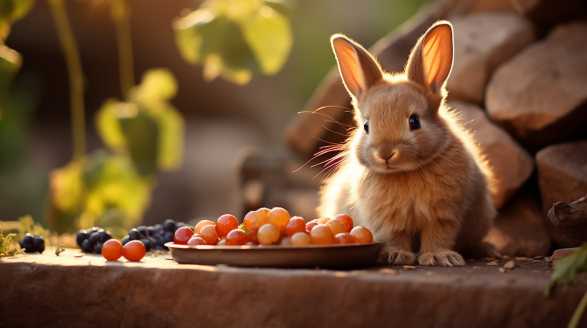
Understanding the Rabbit’s Digestive System
Rabbits have a unique digestive system that is designed for processing high-fiber, plant-based diets. Their digestive tract is divided into two main sections: the small intestine and the cecum.
Rabbits have a natural ability to break down cellulose, a carbohydrate found in plants, into simpler compounds through fermentation. This fermentation process is essential for their overall health and well-being.
The Raisin Debate: To Feed or Not to Feed?
When it comes to raisins, it’s important to note that they are not an ideal food for rabbits. While they may be safe in small quantities, there are potential risks involved that make feeding raisins a questionable choice.
1. Digestive Upset
Raisins are high in sugar and can disrupt the delicate balance of bacteria in a rabbit’s digestive system. This disruption can lead to digestive upset, such as diarrhea or bloating.
2. Dental Issues
Rabbits have continuously growing teeth, and a diet high in sugar can increase the risk of dental problems, including tooth decay and overgrown teeth. Dental issues can cause pain and discomfort, leading to a decreased appetite and overall decline in health.
3. Potential Toxicity
In some cases, raisins can be toxic to rabbits. Raisins contain a natural compound called oxalate, which, when consumed in large amounts, can lead to the formation of calcium oxalate crystals in the urinary system.
Healthy Alternatives to Raisins
While raisins may not be the best option for your rabbit, there are plenty of healthy alternatives that can be incorporated into their diet. Here are some rabbit-approved treats that provide both nutrition and entertainment:
1. Fresh Vegetables
Fresh vegetables are an excellent source of essential vitamins and minerals for rabbits. Leafy greens like kale, spinach, and romaine lettuce are great choices.
2. Hay
Hay is a staple in a rabbit’s diet. It provides the necessary fiber for proper digestion and helps wear down their continuously growing teeth.
3. Herbs
Herbs such as cilantro, parsley, and basil can add variety to your rabbit’s diet. Not only do they provide natural flavors, but they also offer additional health benefits.
4. Safe Fruits
While fruits should be given in moderation due to their sugar content, some safe options include apples, strawberries, and blueberries. Always remove any seeds or pits and cut the fruits into small, rabbit-friendly portions.
Raisins can have a negative impact on a rabbit’s digestive system. Their high sugar content, potential for digestive upset, dental issues, and even toxicity make them a less-than-ideal choice for rabbit treats.
Instead of raisins, opt for fresh vegetables, hay, herbs, and safe fruits as healthy alternatives to provide proper nutrition and entertainment for your rabbit. Remember, variety is key, and always introduce new foods gradually to avoid any digestive issues.
Now that you’re armed with this burst of information, go forth and make informed decisions about your rabbit’s diet. Your fluffy companion will thank you for it!
Raisins: A Tasty and Enriching Snack for Rabbits
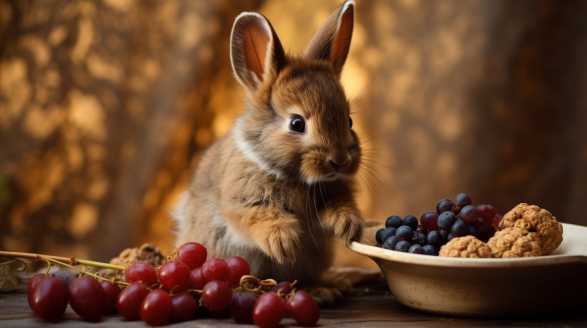
Why Choose Raisins for Your Rabbits?
Raisins are an excellent choice for your rabbits due to the numerous benefits they provide. Here are some reasons why you should consider adding raisins to your bunny’s diet:
- Taste Sensation: Rabbits have a natural sweet tooth, and raisins satisfy their cravings for something flavorful. The natural sugars found in raisins make them a delectable treat that your fluffy companion will be delighted to devour.
- Enriching Nutrients: Raisins are packed with essential nutrients that contribute to your rabbit’s well-being. They contain fiber, potassium, iron, and antioxidants, all of which promote a healthy and balanced diet for your furry friend.
- Improved Digestion: The fiber content in raisins aids in maintaining regular bowel movements, preventing constipation in rabbits. This can help alleviate digestive issues and promote a healthy digestive system.
- Energy Boost: Raisins are an excellent source of natural energy for rabbits. The carbohydrates present in raisins are easily digestible, providing a quick energy boost to keep your bunny active and happy throughout the day.
- Variety and Fun: Introducing new treats into your rabbit’s diet helps prevent boredom and adds some excitement to their daily routine. Raisins are an easy and enjoyable snack to incorporate into their diet, providing a break from their regular food.
How to Safely Introduce Raisins to Your Rabbits
While raisins offer numerous benefits, it’s important to introduce them to your rabbits’ diet safely. Here are some guidelines to follow:
- Moderation is Key: Although raisins are a nutritious treat, they should be given in moderation. Too many raisins can lead to weight gain and other health issues. Limit the serving size to a small handful of raisins per week, depending on the size of your rabbit.
- Gradual Introduction: Start by giving your rabbit a single raisin to see how they react. Monitor their digestive system for any adverse effects. If all goes well, you can gradually increase the amount over time.
- Freshness Matters: Ensure the raisins you offer to your rabbits are fresh and free from additives. Organic raisins are the best choice, as they do not contain any harmful chemicals or preservatives.
- Preventing Choking Hazards: Rabbits tend to eat quickly, which can increase the risk of choking. To minimize this risk, consider slicing the raisins into smaller pieces or rehydrating them before offering them to your rabbit. This will make it easier for them to consume and digest the treat.
Safety Precautions
While raisins can be a delightful addition to your rabbit’s diet, it’s important to be aware of some safety precautions:
- Allergies and Intolerances: Like humans, rabbits can have allergies or sensitivities to certain foods. Monitor your rabbit closely when introducing raisins and discontinue if you notice any adverse reactions such as diarrhea or changes in behavior.
- Avoid High Sugar Content: Raisins are naturally sweet due to their sugar content, so it’s important not to overindulge your rabbit. Excessive sugar intake can lead to weight gain, dental problems, and other health issues. Always remember moderation is key.
Raisins can be a tasty and enriching snack for your beloved rabbits. They provide not only a tantalizing treat but also essential nutrients that contribute to their overall health and well-being.
So go ahead and treat your furry friend to this delightful snack. They’ll love you even more for it!
Remember, a happy bunny is a healthy bunny!
Raisins and Rabbit Obesity: Finding the Right Balance
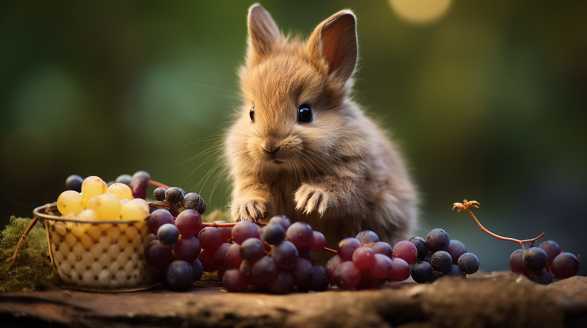
Unveiling the Risks of Obesity in Rabbits
Obesity is a problem that affects not only us humans but also our beloved pets. Sadly, rabbits are not immune to this condition either.
The Rabbit Obesity Epidemic
Obesity among rabbits is a growing concern. Many factors contribute to this epidemic, such as overfeeding, lack of exercise, and improper diet.
The Surprising Impact of Raisins
Now, let’s talk about the star of the show – raisins! These sweet and chewy treats hold a special place in our hearts, but are they safe for our fluffy companions?
Raisins, when consumed in moderation, can be a delightful snack for rabbits. They are packed with essential nutrients like fiber, vitamins, and minerals.
The Dangers of Overfeeding
Overfeeding is a common mistake made by rabbit owners. They might think that just a few extra raisins won’t hurt, but in the long run, it can lead to serious health issues.
Excessive Caloric Intake
Raisins are calorie-dense, meaning they have a high caloric content per serving. Too many raisins can quickly increase a rabbit’s caloric intake, leading to weight gain and, ultimately, obesity.
Digestive Problems
Rabbits have sensitive digestive systems, and excessive raisin consumption can lead to an upset stomach or digestive issues such as diarrhea. This can cause discomfort and put their overall health at risk.
Finding the Right Balance
Now, I’m not saying you should completely eliminate raisins from your rabbit’s diet. After all, they can be a tasty and nutritious treat!
Consult Your Veterinarian
Before introducing raisins or any other treats into your rabbit’s diet, consult your veterinarian. They can provide valuable insights and guidance tailored to your rabbit’s specific needs, ensuring a balanced and healthy lifestyle.
Moderation is the Key
When it comes to treating your rabbit with raisins, moderation is absolutely crucial. Ensure their diet consists primarily of high-quality hay, fresh vegetables, and pellets.
Portion Control
When it comes to portion sizes, smaller is better. A single raisin can go a long way in satisfying your rabbit’s sweet tooth.
Alternative Healthy Treats
If you’re concerned about the potential risks associated with raisins, fret not, for there are plenty of other healthy treats you can offer your rabbit. Here are a few ideas:
Fresh Greens
Leafy greens, such as lettuce, kale, and parsley, are a fantastic choice. They are low in calories and provide essential vitamins and minerals that promote overall health.
Herbs
Herbs like basil, cilantro, and dill make excellent treats. They not only add flavor to your rabbit’s diet but also offer various health benefits.
Safe Fruits
While raisins may pose a risk, there are still safe fruits you can incorporate into your rabbit’s diet. Slice small pieces of apple, strawberry, or banana for a flavorful, yet healthy snack.
Your Rabbit’s Well-Being is in Your Hands
As responsible rabbit owners, it’s our duty to ensure their well-being. By finding the right balance in their diet, we can prevent obesity and promote a healthy and happy life for our furry companions.
Your rabbit will thank you with endless cuddles and unmatched binkies!
Now, go forth and find that perfect balance for your fluffy friend’s diet. Happy munching!
The Importance of Moderation: Serving Size Guidelines for Raisins and Rabbits

Serving Size Guidelines for Rabbits
When it comes to serving sizes for rabbits, moderation is key. Rabbits have sensitive digestive systems that can easily be disrupted by excessive treats.
1. Choose Organic
Opt for organic raisins free from pesticides and preservatives. Remember, your rabbit’s well-being is of utmost importance, so do your best to provide them with the highest quality food.
2. Introduce Slowly
If you’re giving your rabbit raisins for the first time, start with a small portion. Monitor their reaction, ensuring they have no adverse symptoms.
3. Consider Weight and Size
Tailor the serving size to your rabbit’s weight and size. Smaller rabbits should receive smaller portions, while larger rabbits can enjoy a slightly bigger share.
4. Rotate Treats
While raisins are undoubtedly a tasty treat, it’s important to diversify your rabbit’s snacking options. Rotate other safe fruits and veggies, such as apples, carrots, and leafy greens, to add variety and balance to their diet.
5. Maintain a Balanced Diet
Remember that treats should never replace your rabbit’s main diet of fresh hay, high-quality pellets, and water. Treats are just a delightful addition to their daily nutritional intake, so don’t go overboard!
Incorporating Raisins into a Well-Balanced Rabbit Diet
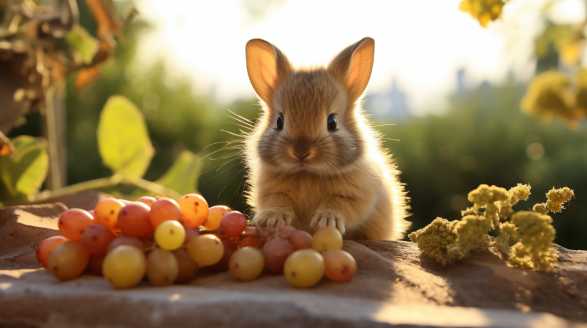
Moderation is Key
While raisins offer several benefits, it’s crucial to remember that moderation is the key. Too many raisins can have adverse effects on your rabbit’s health.
- Portion Control: Limit the number of raisins you provide to your rabbit. Aim for no more than one or two small raisins per week, depending on the size of your bunny.
- Watch for Allergic Reactions: Like humans, rabbits can develop allergies to certain foods. Introduce raisins gradually and observe your bunny for any signs of discomfort, such as diarrhea or upset stomach.
- Monitoring Weight: Raisins contain natural sugars and can contribute to weight gain if consumed in excess. Keep an eye on your rabbit’s weight and adjust the amount of raisins accordingly.
Alternative Treats for Rabbits
While raisins can be a healthy treat option for your rabbit, it’s important to provide a variety of treats to maintain a well-balanced diet. Here are some alternatives to consider:
- Fresh Fruits and Vegetables: Offer a wide range of fresh produce, such as carrots, broccoli, apples, and leafy greens. These make excellent treats and provide essential vitamins and minerals.
- Herbs: Certain herbs, like parsley or cilantro, can be given as treats to add flavor to your rabbit’s diet. They also provide additional nutrients and can be beneficial for dental health.
- Timothy Hay-Based Treats: Look for treats made from timothy hay, as they serve as excellent sources of fiber and provide mental stimulation for your rabbit. Always check the ingredient list to ensure they are suitable for rabbits.
Incorporating raisins into a well-balanced rabbit diet can be a fun and healthy way to provide your furry friend with a little taste adventure. Remember to keep moderation in mind and closely monitor your rabbit’s reaction to ensure their well-being.
By doing so, you’ll create a vibrant and diverse diet that will keep your rabbit hopping with joy!
Conclusion
Wow, what a journey we’ve been on exploring raisins and rabbits! From uncovering the hidden dangers to understanding their impact on digestion, we’ve delved deep into this captivating topic.
So, what have we learned? Well, raisins can be a tasty and nutritious treat for rabbits when given in moderation.
However, it’s crucial to remember the importance of portion control and to be mindful of your rabbit’s individual needs and health conditions.
By finding the right balance and incorporating raisins into a well-balanced diet, we can keep our fluffy friends healthy, happy, and hopping with joy! But let’s not forget, raisins are just one piece of the puzzle.
Remember, being a responsible rabbit owner means constantly seeking knowledge, staying informed, and consulting with professionals when needed. Your veterinarian is your best ally in determining the ideal diet for your specific rabbit, taking into account their age, weight, and any existing health conditions.
So, fellow rabbit enthusiasts, let’s take what we’ve learned and apply it to our furry companions’ lives. Let’s be cautious but curious, adventurous but mindful.
Thank you for joining me on this wild ride through the world of raisins and rabbits. Now, go forth and share your newfound knowledge with fellow rabbit lovers.
Here’s to many more exciting adventures in the world of bunny nutrition!
Frequently Asked Questions
Can rabbits eat raisins?
- Yes, rabbits can eat raisins, but only in small quantities as an occasional treat. Too many raisins can lead to digestive issues in rabbits.
Are raisins safe for rabbits?
- Raisins are generally safe for rabbits to eat in moderation. However, some rabbits may have sensitivities or allergies to fruits, so it’s important to introduce raisins gradually and monitor their reaction.
How many raisins can I give my rabbit?
- It’s best to limit the amount of raisins given to rabbits. A small or medium-sized rabbit can have around 1-2 raisins per week. Larger rabbits may have up to 3-4 raisins per week. Remember, moderation is key!
Can raisins be harmful to rabbits?
- In large quantities, raisins can be harmful to rabbits. They are high in sugar and can cause digestive problems, obesity, or even dental issues if consumed excessively. Always offer raisins as a treat in small portions.
What are the potential health risks of feeding raisins to rabbits?
- Feeding too many raisins to rabbits can lead to weight gain, upset stomach, diarrhea, bloating, or even tooth decay. Monitoring portion sizes and observing your rabbit’s response is important to ensure their well-being.
Can raisins be a part of a rabbit’s regular diet?
- No, raisins should not be a regular part of a rabbit’s diet. A healthy rabbit’s primary diet consists of hay, fresh leafy greens, vegetables, and small amounts of pellets. Treats like raisins should only be given in moderation.
Are there other alternatives to raisins as treats for rabbits?
- Yes, there are numerous alternatives to raisins that you can use as healthy treats for rabbits. Some options include small pieces of apple, carrot, basil, mint, cilantro, or a variety of rabbit-safe fruits and vegetables. Always do your research to ensure the safety of the treat before offering it to your rabbit.
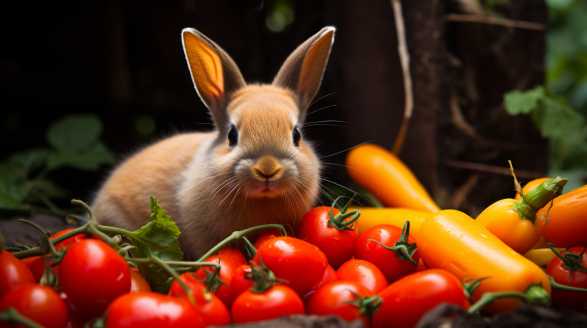
Can Rabbits Eat Sweet Peppers
Introduction Can rabbits eat sweet peppers? Let’s find out. Picture this: a colorful plate filled with vibrant red, yellow, and green sweet peppers, glistening under the warm rays of sunshine. As a devoted bunny parent, I’m always on the lookout for ways to provide a well-rounded diet for my furry friend, and sweet peppers have […]
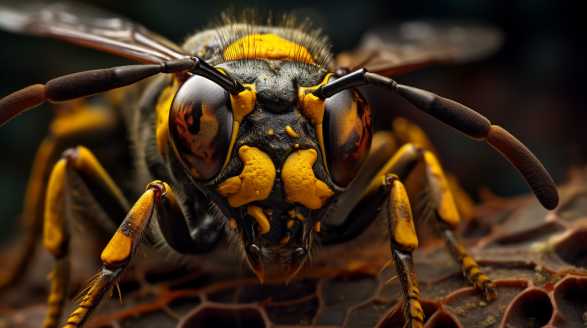
Do Rabbits Eat Insects
Introduction Do rabbits eat insects? Let’s find out. I found myself captivated by the intricate relationship between these fearless bunnies and their six-legged foes. The rabbit, armed with lightning-fast speed, evasive maneuvers, and keen senses, is a formidable herbivore that knows how to outmaneuver its tiny adversaries. We will also unearth the mysteries of the […]
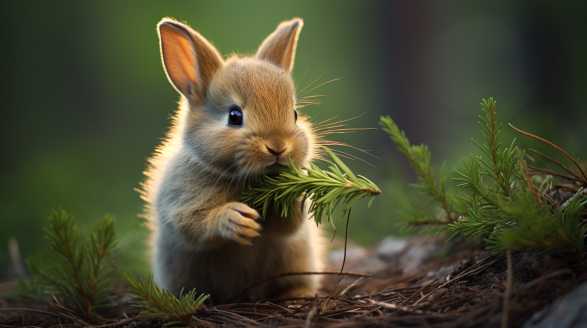
Can Rabbits Eat Rosemary
Introduction Hey there rabbit enthusiasts! Are you looking for ways to enhance your furry friend’s diet? I’ve got an herb that’s going to take your rabbit’s meals to the next level – rosemary! Now, I know what you’re thinking – isn’t rosemary just for flavoring our culinary creations? You see, rosemary is not just a […]
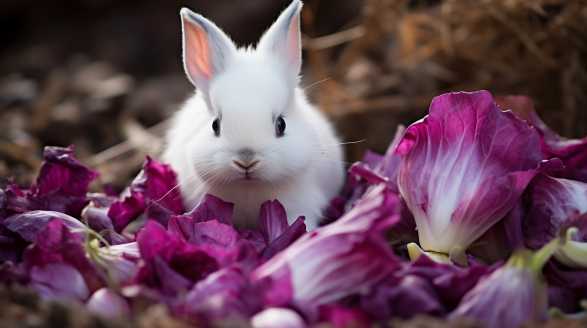
Can Rabbits Eat Radicchio
Introduction Hey there, fellow rabbit owners! Are you constantly wondering what foods are safe and nutritious for your furry little friends? It can be quite a challenge to navigate through the endless options available at the grocery store. One particular debate that has been on my mind lately is the battle of radicchio versus lettuce. […]
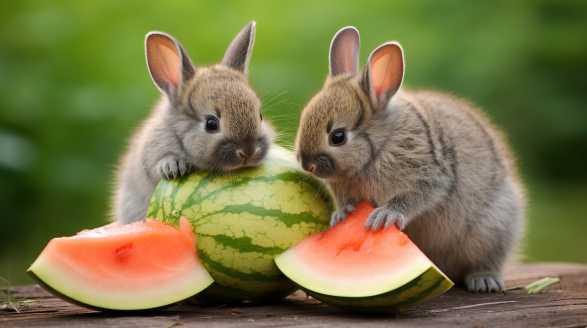
Can Rabbits Eat Melon
Introduction Can Rabbits eat melon? Let’s find out. Picture this: a warm summer day, the sun shining down, and you, lounging by the pool with a juicy slice of watermelon in hand. But have you ever wondered if your bunny could join in on the melon madness? You won’t believe the mouthwatering taste, the refreshing […]
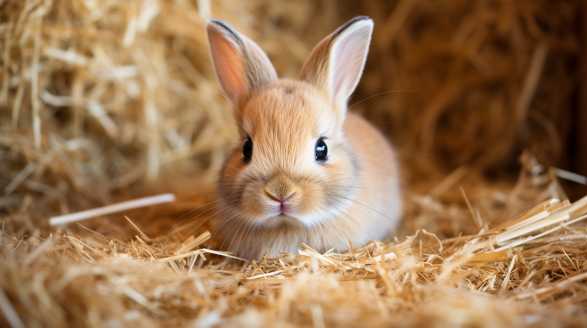
Best Hay For Rabbits
Introduction Hey there, fellow rabbit lovers! What is the best hay for Rabbits? Let’s find out. I’ll be your trusty guide as we explore the different types of hay available for our precious rabbits. We’ll uncover the secrets of Timothy hay, the golden standard for bunny nutrition. The world of hay is vast, my friend, […]
